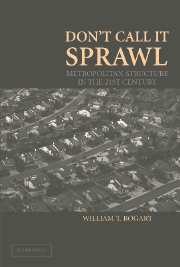Book contents
- Frontmatter
- Contents
- Acknowledgments
- 1 The World of Today
- 2 Making Things Better: The Importance of Flexibility
- 3 Are We There Yet?
- 4 Trading Places
- 5 Downtown: A Place to Work, a Place to Visit, a Place to Live
- 6 How Zoning Matters
- 7 Love the Density, Hate the Congestion
- 8 Homogeneity and Heterogeneity in Local Government
- 9 The World of Tomorrow
- Notes
- References
- Index
1 - The World of Today
Published online by Cambridge University Press: 02 December 2009
- Frontmatter
- Contents
- Acknowledgments
- 1 The World of Today
- 2 Making Things Better: The Importance of Flexibility
- 3 Are We There Yet?
- 4 Trading Places
- 5 Downtown: A Place to Work, a Place to Visit, a Place to Live
- 6 How Zoning Matters
- 7 Love the Density, Hate the Congestion
- 8 Homogeneity and Heterogeneity in Local Government
- 9 The World of Tomorrow
- Notes
- References
- Index
Summary
Marco Polo describes a bridge, stone by stone. “But which is the stone that supports the bridge?” Kublai Khan asks. “The bridge is not supported by one stone or another,” Marco answers, “but by the line of the arch that they form.” Kublai Khan remains silent, reflecting. Then he adds: “Why do you speak to me of the stones? It is only the arch that matters to me.” Polo answers: “Without stones there is no arch.”
Italo Calvino (1972, 82)This is a book about the future of metropolitan areas in the United States. The current state of technology and the existing pattern of land use will determine much of that future over the next few decades. To illustrate this point, consider the prosaic yet easily overlooked fact that all of the adults who will be alive in the next twenty years have already been born. Therefore, it is first necessary to understand the present and the past before looking directly at the future.
Consider housing, for example. Approximately 2 percent of the housing stock in the United States consists of new construction each year. Put another way, more than 80 percent of the housing stock is more than ten years old. The decaying manufacturing districts, public housing projects, and office blocks in some central cities were once brand-new construction. The new construction today is the old building of tomorrow, and the options available to us are restricted by our choices today and in the past.
- Type
- Chapter
- Information
- Don't Call It SprawlMetropolitan Structure in the 21st Century, pp. 1 - 19Publisher: Cambridge University PressPrint publication year: 2006



